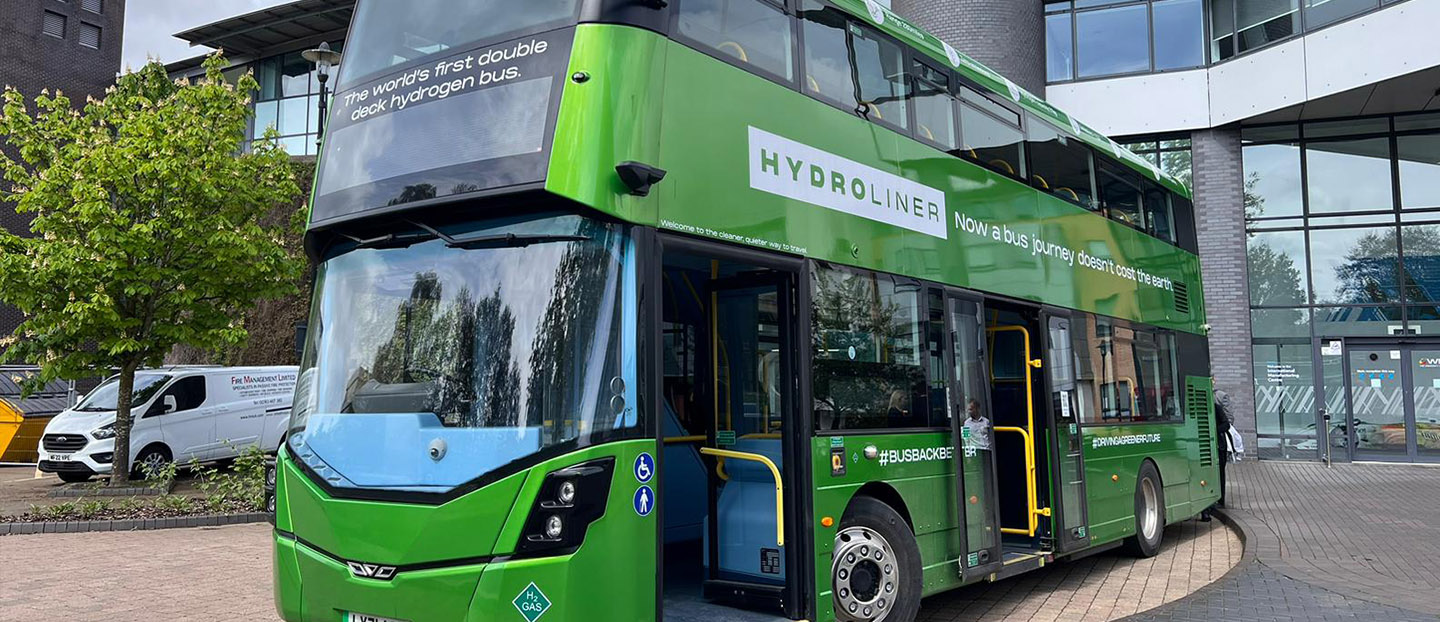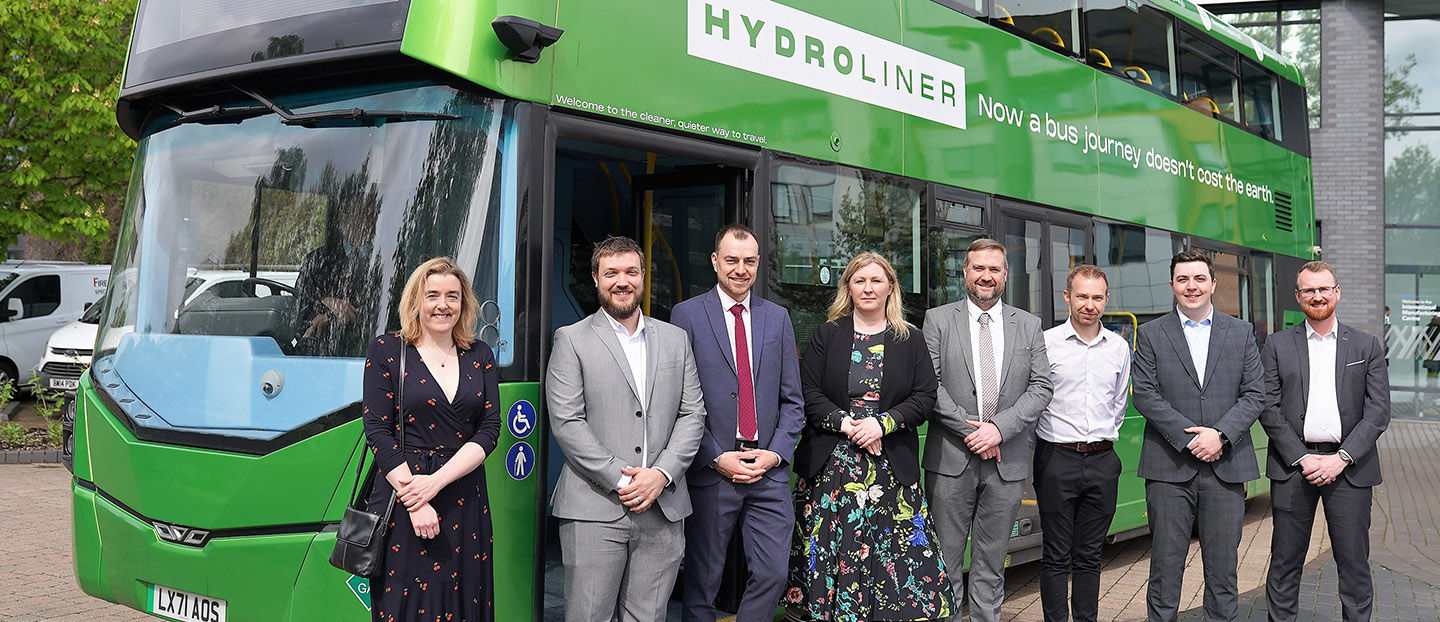
Blue lights, green energy: £77 million for new zero-emission vehicle projects
The schemes will support more than 4,400 jobs across the UK over the next decade, from Bath to Ballymena.
- More than £77 million in joint Government and industry funding to develop zero-emission vehicles including fire engines and ambulances
- Projects expected to support more than 4,400 jobs across the UK over the next decade, delivering the government’s priority to grow the UK economy
- Innovations in clean engine technology, for zero-emission buses and to overhaul EV factory productivity also get backing
Life-saving emergency services will benefit from greener zero-emission vehicles, thanks to £77 million in new funding for projects developing clean transport technologies, announced today.
The HYER POWER project, to develop a hydrogen fuel-cell range extender for specialist electric vehicles in demanding roles like fire engines and ambulances, is just one of seven pieces of work across the UK that are getting joint Government and industry backing.
The schemes, which range from work on battery-powered buses, to a hydrogen-powered version of the iconic Ford Transit van, will support more than 4,400 jobs across the UK over the next decade, from Bath to Ballymena.
Investing in the development of cutting-edge technologies in key industries will help deliver on the government’s priority to grow the UK economy.
Industry and Economic Security Minister Nusrat Ghani said:
Zero-emission cars, vans and taxis are increasingly common, but this cutting-edge work is going to mean clean, green vehicles designed and built in the UK can increasingly take on the toughest jobs too, from life-saving emergency services, to haulage and public transport.
Our automotive industry keeps setting the pace globally and seizing the potential of new technologies. Today’s multi-million-pound boost will help them stay ahead of international competition, while delivering on our priority to grow the economy and support high-quality jobs.
The funding has been awarded through the Advanced Propulsion Centre (APC) Collaborative Research and Development programme, in support of ambitions to build an end-to-end supply chain for zero-emission vehicles (ZEVs) in the UK. £38.4 million of this investment comes from Government, backed by a further £38.7 million from the automobile industry – taking today’s total to just over £77 million.
Joint government and industry funding winners are:
- HYER POWER – ULEMCO Ltd £7.9 million backing to develop a hydrogen fuel cell range extender for electric vehicles used for specialised and challenging purposes, such as ambulances, fire engines and street sweepers.
- HEIDI – Bramble Energy Ltd £12.7 million for work to demonstrate a novel fuel cell/battery hybrid powertrain on a double-decker bus, that will be cheaper than the equivalents currently available for large vehicles.
- FCVGEN2.0 – Ford Motor Company Ltd £16.3 million awarded to design and develop a hydrogen fuel cell-powered version of the Ford Transit van, which will initially be produced at Ford Dagenham.
- NEXTGENZEBS – Wrightbus £12.7 million backing for new, market-leading technology to underpin battery and fuel cell electric buses.
- EleVAIT – JLR Receiving £12.6 million to design and develop technology for inverters – a key component in electric vehicles, supporting the continued growth of a UK-based electric vehicle supply chain.
- CAVENDISH – BorgWarner Awarded £9.8 million for work to speed up the rollout of hydrogen-burning internal combustion engines, as an alternative to diesel, for use in heavy-duty settings.
- ZETTA – Leyland Trucks Ltd A £5.1 million investment. By better use of automation and advanced testing, Leyland Trucks aim to increase productivity and step up their production of battery electric trucks.
Chief Executive at the APC Ian Constance said:
Investment into these seven collaborative projects continues the work that the UK does very well. Research and development, building the automotive supply chain, pushing the boundaries of clean technology for the road, whilst securing jobs across the country. I’m pleased to have well-known brand names among this £77 million funding round through the APC, as well as innovative SMEs bringing through exciting new developments.
Today’s announcement comes on top of funding also being invested by the government through the Automotive Transformation Fund (ATF) to develop a high-value end-to-end electrified automotive supply chain in the UK.
This includes unlocking private investment in gigafactories, battery material supply chains, motors, power electronics, and fuel cell systems. The ATF is being delivered by the Department for Business and Trade in partnership with the APC.
The government has committed a record £211 million to battery research and innovation through the Faraday Battery Challenge, to help the sector deliver 100,000 jobs in battery gigafactories and the battery supply chain by 2040. The funding will be delivered by UK Research and Innovation (UKRI) with support from the Faraday Institution, Innovate UK and the UK Battery Industrialisation Centre (UKBIC).
The UK Hydrogen Strategy sets out how government, working with industry, is aiming to develop 10GW of hydrogen production capacity by 2030, for use across the economy. This forms a part of the British energy security strategyfor delivering secure, clean and affordable British energy for the long term.
Background
EleVAIT – JLR
£6.3 million awarded by government, matched by industry to a total £12.6 million. This research project will explore and develop technology for inverters – a key component in electric vehicles. As well as developing a best-in-class product, this work will support the growth of a UK supply chain in components for electric vehicles.
Project partners include: University of Bristol, Customer Interconnect Ltd, API Capacitors Ltd
Jobs created or safeguarded: 1,258
CO² savings: 55,000 tonnes
FCVGEN2.0 – Ford Motor Company Ltd
£8 million awarded by government, matched by industry to a total £16.3 million. This project will design and develop a hydrogen fuel cell-powered version of the Ford Transit van, with the Ford Dagenham engine factory to be re-purposed for initial production of the vehicle. By bringing the manufacturer, vehicle operator and supply chain businesses together, this project aims to establish a business case for the wider rollout of hydrogen Light Commercial Vehicles.
Project partners include: Ocado, BP, Cygnet Texkimp, Cambustion, Vrititech
Jobs created or safeguarded: 167
CO² savings: 4.1m tonnes
NEXTGENZEBS – Wrightbus
£6.4 million awarded by government, matched by industry to a total £12.7 million. This project will produce a new, market-leading platform for battery and fuel cell electric driven buses. Whilst demand is growing for zero-emission vehicles, there are currently few options available for heavy, multi-axle vehicles like large buses.
Project partners include: Queens University Belfast, Grayson Thermal Systems, Hutchinson Engineering, Translink
Jobs created or safeguarded: 883
CO² savings: 3.4m tonnes
CAVENDISH – BorgWarner
£4.9 million awarded by government, matched by industry to a total £9.8 million. This project aims to speed up the rollout of hydrogen-burning internal combustion engines, as an alternative to diesel. Project Cavendish will develop new fuel and air management systems, so that existing heavy duty diesel technologies can be repurposed to use hydrogen as fuel.
Project partners include: Mahle, Cambustion, Hartridge
Jobs created or safeguarded: 513
CO² savings: 31.6m tonnes
ZETTA – Leyland Trucks Ltd
£2.6 million awarded by government, matched by industry to a total £5.1 million. By better use of automation and advanced testing, Leyland Trucks aim to increase productivity and step up their production of battery electric trucks. A ‘digital twin’ of the Leyland production line will be set up, meaning any changes can be run in simulation before being rolled out physically.
Project partners include: Expert Tooling, HSSMI
Jobs created or safeguarded: 439
CO² savings: 12m tonnes
HYER POWER – ULEMCO Ltd
£3.9 million awarded by government, matched by industry to a total £7.9 million. This project will develop a hydrogen fuel cell range extender for electric vehicles used for special purposes, such as ambulances, fire engines and street sweepers. The zero-emission range extender will be based on existing, proven technology from the Toyota Mirai, and demonstrate how zero emission vehicles can be used in a wide range of specialised and challenging settings.
Project partners include: Altair Engineering, Emergency One, Technical Services Ltd, Oxon Fire & Rescue Services
Jobs created or safeguarded: 682
CO² savings: 1.1m tonnes
HEIDI – Bramble Energy Ltd
£6.3 million awarded by government, matched by industry to a total £12.7 million. This project will demonstrate a fuel cell/battery hybrid powertrain on a double-decker bus. This novel product will be cheaper than the equivalents currently available for large vehicles like buses, and uses innovative new electronics and energy recovery technologies.
Project partners include: University of Bath, Equipmake, Aeristech
Jobs created or safeguarded: 498
CO² savings: 5.9m tonnes
About the Advanced Propulsion Centre UK
The Advanced Propulsion Centre (APC) collaborates with UK government, the automotive industry and academia to accelerate the industrialisation of technologies, supporting the transition to deliver net-zero emission vehicles.
Since its foundation in 2013, APC has funded 199 low-carbon projects involving 450 partners, working with companies of all sizes, and will have helped to create or safeguard over 55,000 jobs in the UK. The technologies developed in these projects are projected to save over 350 million tonnes of CO² , the equivalent of removing the lifetime emissions from 14.1 million cars.
With its deep sector expertise and cutting-edge knowledge of new propulsion technologies, APC’s role in building and advising project consortia helps projects start more quickly and deliver increased value. In the longer term, its work to drive innovation and encourage collaboration is building the foundations for a successful and sustainable UK automotive industry.
In 2019 the UK government committed the Automotive Transformation Fund (ATF) to accelerate the development of a net-zero vehicle supply chain, enabling UK-based manufacturers to serve global markets. ATF investments are awarded through the APC to support strategically important UK capital and R&D investments that will enable companies involved in batteries, motors and drives, power electronics, fuel cells, and associated supply chains to anchor their future.
For more information please visit the APC website or follow @theapcuk on Twitter and Advanced Propulsion Centre UK on LinkedIn.

Read more

Get in touch
Wrightbus has been at the forefront of transport innovation since 1946, relentlessly pushing the boundaries with its commitment to quality, style and safety.
